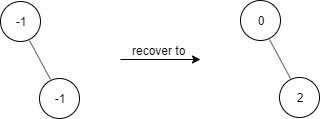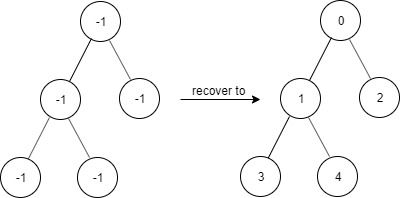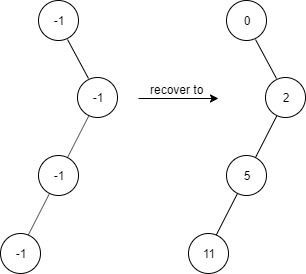Given a binary tree with the following rules:
root.val == 0- If
treeNode.val == xandtreeNode.left != null, thentreeNode.left.val == 2 * x + 1 - If
treeNode.val == xandtreeNode.right != null, thentreeNode.right.val == 2 * x + 2
Now the binary tree is contaminated, which means all treeNode.val have been changed to -1.
Implement the FindElements class:
FindElements(TreeNode* root)Initializes the object with a contaminated binary tree and recovers it.bool find(int target)Returnstrueif thetargetvalue exists in the recovered binary tree.
Example 1:
Input ["FindElements","find","find"] [[[-1,null,-1]],[1],[2]] Output [null,false,true] Explanation FindElements findElements = new FindElements([-1,null,-1]); findElements.find(1); // return False findElements.find(2); // return True
Example 2:
Input ["FindElements","find","find","find"] [[[-1,-1,-1,-1,-1]],[1],[3],[5]] Output [null,true,true,false] Explanation FindElements findElements = new FindElements([-1,-1,-1,-1,-1]); findElements.find(1); // return True findElements.find(3); // return True findElements.find(5); // return False
Example 3:
Input ["FindElements","find","find","find","find"] [[[-1,null,-1,-1,null,-1]],[2],[3],[4],[5]] Output [null,true,false,false,true] Explanation FindElements findElements = new FindElements([-1,null,-1,-1,null,-1]); findElements.find(2); // return True findElements.find(3); // return False findElements.find(4); // return False findElements.find(5); // return True
Constraints:
TreeNode.val == -1- The height of the binary tree is less than or equal to
20 - The total number of nodes is between
[1, 104] - Total calls of
find()is between[1, 104] 0 <= target <= 106
# Definition for a binary tree node.
# class TreeNode:
# def __init__(self, val=0, left=None, right=None):
# self.val = val
# self.left = left
# self.right = right
class FindElements:
def __init__(self, root: TreeNode):
root.val = 0
self.nodes = {0}
def dfs(root):
if root is None:
return
if root.left:
root.left.val = root.val * 2 + 1
self.nodes.add(root.left.val)
if root.right:
root.right.val = root.val * 2 + 2
self.nodes.add(root.right.val)
dfs(root.left)
dfs(root.right)
dfs(root)
def find(self, target: int) -> bool:
return target in self.nodes
# Your FindElements object will be instantiated and called as such:
# obj = FindElements(root)
# param_1 = obj.find(target)/**
* Definition for a binary tree node.
* public class TreeNode {
* int val;
* TreeNode left;
* TreeNode right;
* TreeNode() {}
* TreeNode(int val) { this.val = val; }
* TreeNode(int val, TreeNode left, TreeNode right) {
* this.val = val;
* this.left = left;
* this.right = right;
* }
* }
*/
class FindElements {
private Set<Integer> nodes;
public FindElements(TreeNode root) {
nodes = new HashSet<>();
root.val = 0;
nodes.add(0);
dfs(root);
}
public boolean find(int target) {
return nodes.contains(target);
}
private void dfs(TreeNode root) {
if (root == null) {
return;
}
if (root.left != null) {
root.left.val = root.val * 2 + 1;
nodes.add(root.left.val);
}
if (root.right != null) {
root.right.val = root.val * 2 + 2;
nodes.add(root.right.val);
}
dfs(root.left);
dfs(root.right);
}
}
/**
* Your FindElements object will be instantiated and called as such:
* FindElements obj = new FindElements(root);
* boolean param_1 = obj.find(target);
*//**
* Definition for a binary tree node.
* struct TreeNode {
* int val;
* TreeNode *left;
* TreeNode *right;
* TreeNode() : val(0), left(nullptr), right(nullptr) {}
* TreeNode(int x) : val(x), left(nullptr), right(nullptr) {}
* TreeNode(int x, TreeNode *left, TreeNode *right) : val(x), left(left), right(right) {}
* };
*/
class FindElements {
public:
unordered_set<int> nodes;
FindElements(TreeNode* root) {
root->val = 0;
nodes.clear();
nodes.insert(0);
dfs(root);
}
bool find(int target) {
return nodes.count(target);
}
void dfs(TreeNode* root) {
if (!root) return;
if (root->left) {
root->left->val = root->val * 2 + 1;
nodes.insert(root->left->val);
}
if (root->right) {
root->right->val = root->val * 2 + 2;
nodes.insert(root->right->val);
}
dfs(root->left);
dfs(root->right);
}
};
/**
* Your FindElements object will be instantiated and called as such:
* FindElements* obj = new FindElements(root);
* bool param_1 = obj->find(target);
*//**
* Definition for a binary tree node.
* type TreeNode struct {
* Val int
* Left *TreeNode
* Right *TreeNode
* }
*/
type FindElements struct {
nodes map[int]bool
}
func Constructor(root *TreeNode) FindElements {
root.Val = 0
nodes := make(map[int]bool)
nodes[0] = true
var dfs func(root *TreeNode)
dfs = func(root *TreeNode) {
if root == nil {
return
}
if root.Left != nil {
root.Left.Val = root.Val*2 + 1
nodes[root.Left.Val] = true
}
if root.Right != nil {
root.Right.Val = root.Val*2 + 2
nodes[root.Right.Val] = true
}
dfs(root.Left)
dfs(root.Right)
}
dfs(root)
return FindElements{nodes}
}
func (this *FindElements) Find(target int) bool {
return this.nodes[target]
}
/**
* Your FindElements object will be instantiated and called as such:
* obj := Constructor(root);
* param_1 := obj.Find(target);
*/


